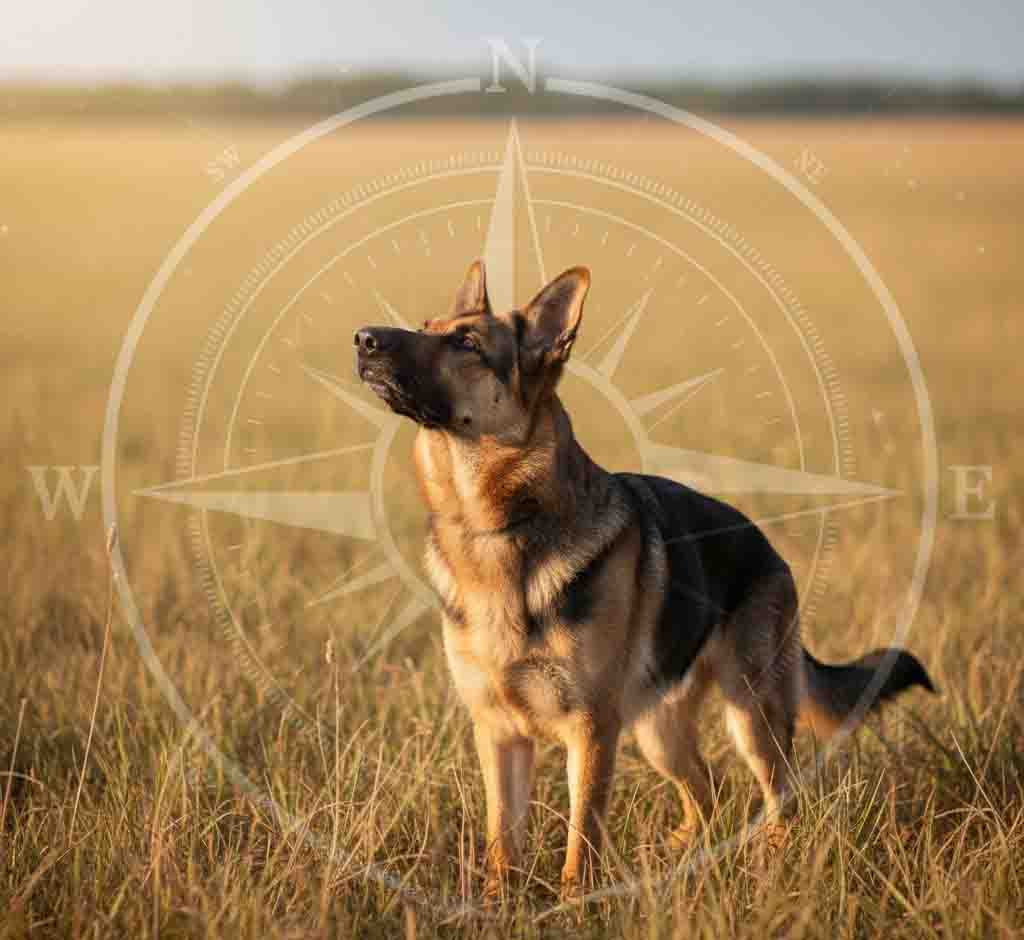It’s a story many pet owners swear by: your dog starts acting strangely hours before a thunderstorm arrives, or your cat stares intently at an empty doorway moments before you hear a family member’s car pull in the driveway. These unexplained behaviors often leave us wondering—do our pets possess something beyond the five basic senses we understand?
While it might seem like magic or supernatural ability, science is beginning to reveal that what we often call a “sixth sense” in animals represents extraordinary extensions of their known senses, combined with remarkable abilities we’re only beginning to understand.
The Magnetic Sense: Nature’s Built-In GPS
One of the most well-documented extraordinary animal abilities is magnetoreception—the capacity to detect Earth’s magnetic fields. This built-in biological compass helps many species navigate in ways that seem almost impossible to humans.
German and Czech researchers made a remarkable discovery when studying 70 dogs during their bathroom routines. They found that when dogs weren’t restrained by leashes, they consistently aligned their bodies with Earth’s north-south magnetic axis while relieving themselves. This magnetic orientation wasn’t just a random preference—it appeared to be part of how dogs map and navigate their world .
This magnetic sense might explain those incredible stories of pets finding their way home across incredible distances. The current world record is held by a Labrador-Boxer mix named Jimpa, who in 1979 traveled an astonishing 3,218 kilometers over 14 months to return to his owners in Australia .
But dogs aren’t alone in this ability. Scientists have identified magnetic sensitivity in various species, including foxes, deer, cattle, and even butterflies. Each species uses this sense differently—while dogs may use it for navigation, red foxes appear to use magnetic sensing to calculate the perfect pounce on hidden prey.
The Unexplained Connection: Pets and Human Emotions
Perhaps the most commonly reported “sixth sense” in pets is their apparent ability to detect human emotions and impending events. Many owners have stories of their pets behaving unusually before medical emergencies or comforting them during times of distress—often before any outward signs are visible.
Research into animal intuition has documented numerous cases suggesting some form of connection between pets and their owners. One analysis of 5,000 animal intuition cases found 177 documented instances of dogs apparently sensing their owner’s death or distress from a distance, typically responding with whining, howling, or other vocalizations.
Cats, too, demonstrate remarkable sensitivity to human states. Many cat owners report their feline companions seeming to detect their emotional distress and offering comfort. While the mechanisms aren’t fully understood, some researchers speculate that animals might detect subtle chemical changes or energy fields that escape human perception.
Beyond Five Senses: Extraordinary Animal Perceptions
The animal kingdom possesses sensory abilities that seem like superpowers to humans:
-
Electroreception: Sharks, rays, and even platypuses can detect electrical fields generated by other animals’ muscle movements, helping them locate prey in dark or murky waters.
-
Infrared Vision: Some snakes including pythons and pit vipers can “see” heat signatures through specialized pit organs on their faces, allowing them to hunt warm-blooded prey in complete darkness.
-
Polarized Light Vision: Cuttlefish and other marine animals can detect polarized light, providing them with visual information unavailable to humans that helps with navigation and hunting.
While our household pets may not possess all these extreme adaptations, they do have sensory capabilities far beyond our own. Dogs’ sense of smell is approximately one million times more sensitive than humans’, allowing them to detect scents we can’t begin to perceive. Cats can hear frequencies up to 64,000 Hz compared to our 20,000 Hz, making them sensitive to sounds we never notice.
The Science Behind the “Supernatural”
What we often interpret as a sixth sense might actually represent animals detecting subtle cues through their enhanced regular senses, combined with their different perception of the world.
Recent visual illusion studies provide fascinating insights into how differently animals perceive reality. When researchers tested guppy fish and ring doves with the Ebbinghaus illusion (where identical circles appear different sizes due to their surroundings), they found guppies were consistently fooled—much like humans—while doves showed varied responses .
These differences likely reflect evolutionary adaptations to different environments and survival needs. As one researcher noted, visual illusions “can serve as a way to reveal all the different ways in which the world can be perceived” .
Living with Extraordinary Perception
Understanding that our pets experience a richer sensory world has practical implications for how we care for them. That “unexplained” anxiety or unusual behavior might be your pet reacting to stimuli you can’t perceive—from distant thunderstorms below your hearing range to subtle geomagnetic fluctuations.
When your pet seems to sense something you can’t, consider that:
-
They might be detecting weather changes through pressure variations
-
They could be hearing frequencies outside your range
-
They might be smelling chemical changes associated with your emotional state
-
They could be reacting to subtle environmental cues you’ve overlooked
The Wonder of What We Don’t Yet Understand
While science has explained many animal abilities once considered magical, there remain documented cases that challenge our current understanding. The key is maintaining both skepticism and wonder—recognizing that our pets experience a world far richer and more complex than what we perceive directly.
Your dog’s inexplicable excitement before you arrive home or your cat’s apparent prediction of an earthquake might not be supernatural, but it does reflect sensory capabilities we’re still working to understand. These extraordinary perceptions remind us that there are still wonders in the natural world waiting to be explained by science.
So the next time your pet seems to sense something you can’t, take a moment to appreciate the complex sensory world they inhabit. That “sixth sense” might not be magic—but living with creatures who experience reality so differently from us? That’s pretty magical in its own right.





